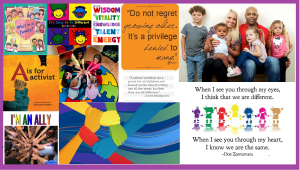Click on the image to enlarge it 🙂
Monthly Archives: February 2014
“We don’t say those words in class!”
By Saturday of this week, Post the following on your Blog:
•A time when you witnessed an adult (or yourself) reprimand or silence a child after he or she pointed out someone they saw as different (e.g., “That lady talks funny,” ” That man only has one leg!” “Why is that man so pretty!”). Include what the child said and what the adult did or said in response. (Note: If you cannot think of a specific time ask a friend or family member.)
•What messages might have been communicated to this child by the adult’s response
•An example of how an anti-bias educator might have responded to support the child’s (or classroom’s ) understanding
I can think of a time when I silenced my own child when he pointed out someone that they saw as different. I always talk to my son about how everyone has differences and he seems to understand what I teach him. He has asked me what the picture on handicapped parking spaces means and always has lots of questions. But he is only 4 years old and I imagine that talking about people is completely different than seeing people. We were in a restaurant a few weeks ago and there was a guy in a wheel chair at the table next to us. My son did not see him until we got up to leave and he turned around, saw him, and very loudly started to say, “Mommy, look! That guy is in a wheelchair like the ones on the signs!” I quickly silenced him and walked him away from the table. I explained to him that it’s okay if he sees someone in a wheelchair but he shouldn’t point it out because sometimes it makes people sad that they are in wheelchairs.” His response was, “yeah. I might be sad if my legs didn’t work very well.” And I said, “Yeah. You don’t want to make him sad. So next time just wave hi because he is just the same as you accept that he’s in a wheelchair.” My sons response was, “yeah he is.” I found this the best way to help him understand why he shouldn’t point it out.
When Cole first asked me why people have to sit in wheelchairs I told him that sometimes people’s legs don’t work the same as his do so they need a wheelchair to help them get around. Despite knowing that he was only pointing out that he saw something he recognized and there was no mean or malicious intent behind it, I don’t want others to feel uncomfortable because he is pointing out their disability. My silencing him could have communicated to him that he was doing something wrong. But I hope that my explanation after pulling him away helped him to understand why I silenced him to begin with.
To be honest, I think that what I did was the right thing. I am a teacher mom. I explain a lot and therefore my child has understanding or knowledge of things that a lot of parents I know don’t take the time to explain. I think that explaining gives children a better understanding of why not to do or say certain things and why other things are important. In the four years I have been a mother, I have never once said, “Because I said so” and that is something I am very proud of.

